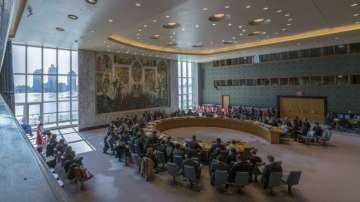India's decision on Jammu and Kashmir's special status has landed up on an international forum, courtesy Pakistan and its "all-weather friend" China. The United Nations Security Council (UNSC) will meet on Friday to discuss India revoking the special status of Jammu and Kashmir after Pakistan wrote a letter on the issue to the world body. China asked for closed consultations in the Council, which will meet at 7:30 pm today to discuss the matter.
Kashmir special status move on UNSC table: Here's what it means
Pakistan is in fear ever since India announced revocation of Jammu and Kashmir's special status on August 5 and bifurcated the state into two Union Territories of J&K and Ladakh. The moment Pakistan saw its worst fears come true, several rounds of meetings were held. Pakistan then formally called for an emergency meeting of the United Nations Security Council. Pakistan's Foreign Minister Shah Mahmood Qureshi sent a formal letter to the president of the security council, Polish Ambassador Joanna Wronecka, through country's Permanent Representative Maleha Lodhi to convene the meeting.
Qureshi had air-dashed to Beijing for consultation with the Chinese leadership on the issue of raising the Kashmir issue at the UNSC. He had also said that China backed Pakistan on the issue and Chinese Foreign Minister Wang told him he believed "China will stand up for justice on the Kashmir issue".
During his bilateral meeting with China's Foreign Minister Wang Yi on Monday in Beijing, External Affairs Minister S Jaishankar conveyed that the decision to revoke the special status of Jammu and Kashmir was an internal matter for India.
He said the issue related to changes in a temporary provision of the Constitution of India and was the sole prerogative of the country.
Jaishankar noted that the legislative measures were aimed at promoting better governance and socio-economic development and there was no implication for either the external boundaries of India or the Line of Actual Control (LAC) with China.
"India was not raising any additional territorial claims. The Chinese concerns in this regard were therefore misplaced," he said.
Jaishankar told Wang that these changes had no bearing on Pakistan as it was an internal matter.
India has categorically told the international community that its move to scrap Article 370 of the Constitution removing the special status to Jammu and Kashmir was an internal matter and has also advised Pakistan to "accept the reality”.
Closed meetings are not open to the public and no verbatim record of statements is kept. Consultations are informal meetings of the Security Council members and are not covered in the Repertoire.
The Repertoire, mandated by the General Assembly, provides comprehensive coverage of the Security Council’s interpretation and application of the United Nations Charter and its own Provisional Rules of Procedure since 1946.
Its primary purpose is to provide Member States, including those elected to serve on the Security Council, the United Nations system, academics and others with a source of information regarding the evolving practice of the Security Council.
According to UN records, the last time "the Security Council addressed the dispute between India and Pakistan over the territories of Jammu and Kashmir” under agenda item 'The India-Pakistan question' was in 1964-65. Then, by a letter dated January 16, 1964, the representative of Pakistan had requested the President of the Council to "convene an immediate meeting" of the Council to consider the Kashmir situation.
India had asserted that the Pakistani request was "a propaganda move." The issue of Kashmir was also raised under a separate agenda item 'Situation in the India/Pakistan subcontinent' in 1969-1971.
ALSO READ | Pakistan asks UNSC to meet over India's Kashmir move
ALSO READ | China asks for UNSC meeting to discuss Kashmir after Pakistan writes letter to UN
Latest India News
